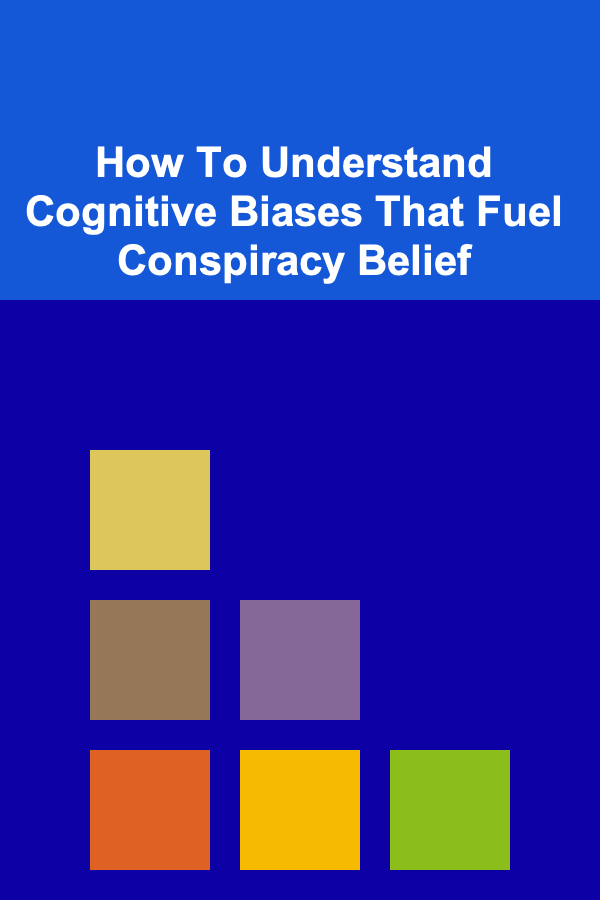
How To Understand Cognitive Biases That Fuel Conspiracy Belief
ebook include PDF & Audio bundle (Micro Guide)
$12.99$9.99
Limited Time Offer! Order within the next:

Conspiracy beliefs have been a part of human history for centuries, shaping perceptions of reality in ways that influence individuals and societies. From historical events to modern-day political and social phenomena, conspiracy theories continue to proliferate in the digital age. One of the most intriguing aspects of conspiracy beliefs is the psychological mechanisms behind why people believe in them, despite the lack of evidence. These beliefs are often driven by cognitive biases---mental shortcuts and patterns of thinking that lead to systematic errors in judgment. Understanding these biases is crucial for not only addressing the spread of conspiracy theories but also for fostering a more informed and critical society. This article will delve into the cognitive biases that fuel conspiracy belief, how they work, and how individuals can become more aware of these biases to make better judgments.
What Are Cognitive Biases?
Cognitive biases are systematic patterns of deviation from norm or rationality in judgment, whereby inferences about other people and situations may be drawn in an illogical fashion. These biases are often the result of the brain's attempts to simplify complex decision-making processes. While these shortcuts can be adaptive in certain situations, they often lead to errors in reasoning, particularly when individuals are confronted with ambiguous or emotionally charged information.
Cognitive biases can significantly influence how people perceive the world around them. In the context of conspiracy beliefs, these biases help individuals interpret information in a way that confirms their pre-existing beliefs or anxieties. Conspiracy theories thrive on these biases, as they often present simple and emotionally satisfying explanations for complex events.
Common Cognitive Biases Behind Conspiracy Belief
Several cognitive biases are particularly relevant when it comes to understanding why people believe in conspiracy theories. These biases tend to magnify paranoia, distrust, and the desire for simple answers to complex problems. Below are some of the most common biases that fuel conspiracy belief:
1. Confirmation Bias
Confirmation bias is the tendency to search for, interpret, and remember information in a way that confirms one's pre-existing beliefs or hypotheses, while giving disproportionately less consideration to alternative possibilities. This bias is particularly potent when it comes to conspiracy theories because people who believe in conspiracies tend to focus exclusively on evidence that supports their theories and ignore evidence that contradicts them.
For example, someone who believes in a conspiracy theory about government surveillance might highlight every news story or personal anecdote that hints at this reality, while dismissing credible evidence to the contrary. Confirmation bias makes it difficult to change a person's view, as they will actively reject information that challenges their worldview.
2. Proportionality Bias
Proportionality bias is the tendency to assume that large, dramatic events must have equally large and dramatic causes. People who fall victim to this bias often believe that significant occurrences, such as natural disasters, terrorist attacks, or political scandals, must be the result of elaborate plots or conspiracies. The belief that "big events require big explanations" drives individuals to find sinister motives or hidden forces behind major societal happenings.
For instance, when an airline crashes, some may immediately believe it's not just an accident but a deliberate act, orchestrated by hidden powers. This bias stems from the human tendency to search for order and control in chaotic situations, and it can make individuals more likely to embrace conspiracy explanations.
3. The Illusory Truth Effect
The illusory truth effect refers to the tendency to believe information is true after repeated exposure, regardless of its accuracy. This cognitive bias is closely tied to the spreading of conspiracy theories, especially in the age of social media and viral misinformation. The more frequently a conspiracy theory is encountered, the more likely it is that individuals will accept it as true.
Even if the conspiracy theory is debunked or lacks credible evidence, the mere repetition of the idea across various platforms can solidify its acceptance. This bias is why "fake news" and misinformation about conspiracy theories can spread so quickly and be so hard to combat. Repetition creates familiarity, and familiarity breeds belief.
4. The Dunning-Kruger Effect
The Dunning-Kruger effect is a cognitive bias in which people with low ability or knowledge in a specific domain tend to overestimate their own competence. In the context of conspiracy beliefs, this bias is evident when individuals who are not experts in a particular field---such as science, politics, or history---feel overly confident in their understanding of complex issues.
Many conspiracy theorists, for example, argue that they have "figured it out" and know the "real truth," even when they lack the expertise or critical thinking skills to assess the evidence properly. This inflated sense of knowledge can lead them to dismiss the insights of actual experts, reinforcing their belief in the conspiracy.
5. In-group Bias
In-group bias refers to the tendency to favor individuals who belong to the same group as oneself and to view those outside the group with suspicion or distrust. This bias can fuel conspiracy beliefs by creating an "us versus them" mentality. Conspiracy theorists often feel that they are part of an enlightened group that knows the truth, while others---especially those who oppose or dismiss the conspiracy---are part of the "misled" or "controlled" masses.
This sense of belonging can be incredibly reinforcing, as it provides social validation for the beliefs in question. By viewing conspiracies as a shared secret, members of the in-group feel that they have special knowledge and insight, setting them apart from others. This exclusivity can further entrench their beliefs.
6. Availability Heuristic
The availability heuristic is the cognitive bias that causes people to overestimate the likelihood of an event based on how easily examples come to mind. In the case of conspiracy theories, individuals who have encountered a number of sensationalized stories about covert government operations, scientific cover-ups, or corporate malfeasance are more likely to believe these events are more common or widespread than they actually are.
The frequent media exposure to these stories creates a mental "catalog" of examples that confirm the conspiracy theorist's view. The more examples a person can recall, the more likely they are to believe that the conspiracy is real, even if these examples are isolated incidents rather than part of a larger, coordinated effort.
7. Agency Detection Bias
Humans are wired to detect agency---intentional action by a person or group---because it has survival value. This tendency, known as agency detection bias, can lead individuals to attribute events or outcomes to the actions of specific agents, even when there is no such intent. Conspiracy theories often capitalize on this bias, with believers attributing large-scale social or political phenomena to the actions of a secret, powerful group.
For instance, when a significant political event occurs, conspiracy theorists may immediately assume that it was orchestrated by a shadowy group, such as "the elites" or a covert government agency, rather than attributing it to the complexity of political systems or random chance. The brain naturally wants to identify a cause, even if it's an unwarranted one.
How Cognitive Biases Contribute to the Spread of Conspiracy Theories
These cognitive biases do not operate in isolation but often interact to reinforce one another, creating a perfect storm of belief in conspiracy theories. When multiple biases align, they compound each other, making it even harder to dislodge the belief in question. The feedback loop between these biases can trap individuals in an echo chamber where their beliefs are constantly reinforced, making them resistant to outside information.
Social media platforms, in particular, play a significant role in this process. By creating spaces where like-minded individuals can gather and share ideas, these platforms amplify confirmation bias and in-group bias. Algorithms that prioritize sensationalist or emotionally charged content also contribute to the availability heuristic, ensuring that conspiracy-related posts are more likely to be seen and shared.
The viral nature of misinformation in online communities means that cognitive biases can spread quickly, creating widespread belief in conspiracy theories even in the absence of factual evidence.
Combating Cognitive Biases and Conspiracy Beliefs
Understanding cognitive biases is the first step in combating the spread of conspiracy beliefs. While it is difficult to completely eliminate these biases, individuals can take steps to become more aware of their thinking patterns and improve their decision-making.
1. Encourage Critical Thinking
Promoting critical thinking is one of the most effective ways to mitigate the influence of cognitive biases. This includes questioning the sources of information, considering alternative explanations, and seeking out credible evidence before forming a conclusion. Encouraging individuals to engage with diverse viewpoints and to examine their assumptions can help challenge confirmation bias.
2. Increase Media Literacy
Media literacy is essential in today's world, where misinformation is rampant. Teaching individuals how to evaluate sources, identify logical fallacies, and distinguish between fact and opinion can help counter the illusory truth effect and the availability heuristic. Understanding how social media algorithms work and the role they play in amplifying misinformation can also help individuals navigate online spaces more critically.
3. Foster Empathy and Open Dialogue
In order to reduce in-group bias and the "us versus them" mentality, it is important to foster empathy and encourage open dialogue. Conversations with individuals who hold different beliefs can help create mutual understanding and break down the barriers that conspiracy theorists often build around themselves. Encouraging respectful, evidence-based discussions can challenge the echo chambers that reinforce conspiracy beliefs.
4. Focus on Psychological Resilience
Finally, addressing the underlying psychological needs that drive conspiracy beliefs can help individuals resist falling prey to them. Many conspiracy theories provide a sense of control, certainty, and security in an unpredictable world. By offering alternative sources of comfort and security, such as promoting critical thinking skills, mental health resources, and community-building, individuals may be less likely to seek solace in conspiracy theories.
Conclusion
Cognitive biases play a crucial role in fueling conspiracy beliefs by distorting how people perceive information, process evidence, and form conclusions. These biases---such as confirmation bias, proportionality bias, and the illusory truth effect---interact in ways that make conspiracy theories more appealing and difficult to dislodge. By understanding the cognitive mechanisms at play, individuals can become more aware of their own thinking processes and learn to make more informed judgments. Combating the spread of conspiracy beliefs requires a multifaceted approach, including fostering critical thinking, improving media literacy, and promoting open dialogue. By addressing these biases at both the individual and societal levels, we can create a more informed and rational public discourse.

How to Stage an Empty Home to Help Buyers Visualize
Read More
How to Use Bins and Baskets for Office Supply Storage
Read More
How to Use Decorative Trays for Remote Controls and Small Items
Read More
How to Use Affinity Photo for Photo Editing
Read More
How To Master the World of Genetics
Read More
Overcoming Procrastination with Stoic Principles: A Deep Dive
Read MoreOther Products

How to Stage an Empty Home to Help Buyers Visualize
Read More
How to Use Bins and Baskets for Office Supply Storage
Read More
How to Use Decorative Trays for Remote Controls and Small Items
Read More
How to Use Affinity Photo for Photo Editing
Read More
How To Master the World of Genetics
Read More